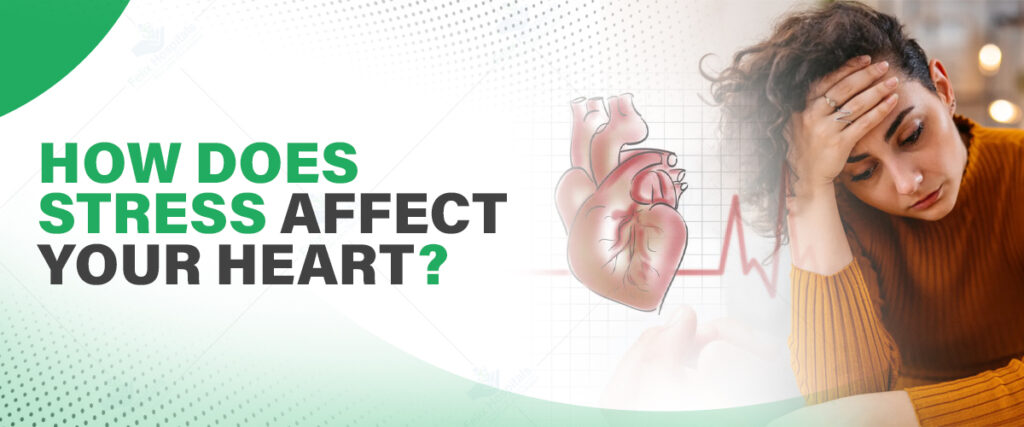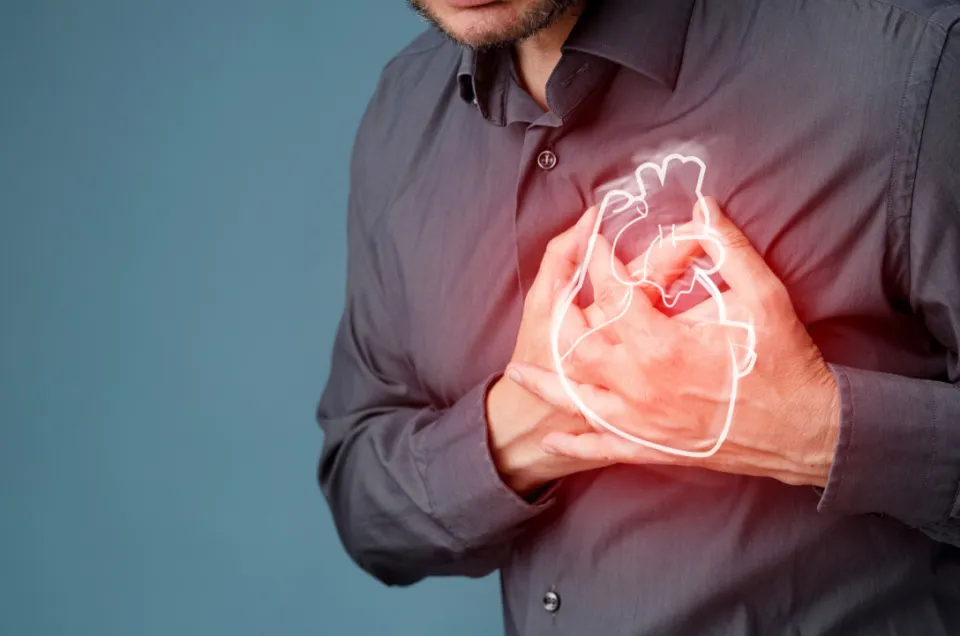
Stress doesn’t directly cause heart disease but can trigger or worsen early warning signs like chest discomfort, fatigue, and palpitations by affecting heart rate, blood pressure, and inflammation. Recognizing stress-related heart symptoms early enables timely treatment and prevents severe cardiac events such as heart attacks or strokes.
Key Takeaways
- Chronic stress raises blood pressure, heart rate, and inflammation levels.
- Early warning signs: chest pain, palpitations, breathlessness, dizziness, fatigue.
- Ignoring these symptoms can lead to heart failure, arrhythmia, or heart attack.
- Stress worsens risk factors like high cholesterol, hypertension, and poor lifestyle.
- Managing stress through exercise, sleep, mindfulness, and balanced diet protects heart health.
- Seek medical help if symptoms appear frequently or worsen with emotional stress.
Why Recognizing Stress-Related Early Symptoms Is Critical
Heart disease often develops quietly over many years. Stress activates the body’s fight-or-flight response, raising blood pressure and heart rate, promoting inflammation, and encouraging unhealthy behaviors that damage arteries. These changes can manifest as early warning signs including:
- Chest pressure or discomfort
- Rapid or irregular heartbeat (palpitations)
- Shortness of breath
- Persistent fatigue
- Dizziness or faintness
Ignoring these signals especially if they happen frequently or with physical activity can lead to worsening heart conditions. Early recognition and management of stress-related symptoms save lives by enabling medical evaluation and preventive care.
Understanding the Early Effects of Stress on the Heart

Stress influences several physiological processes key to heart health:
- Increased arterial pressure: Stress hormones cause blood vessels to constrict, elevating blood pressure and forcing the heart to work harder.
- Inflammatory response: Chronic stress promotes inflammation, accelerating plaque buildup in arteries (atherosclerosis).
- Disrupted heart rhythms: Stress can precipitate arrhythmias, causing palpitations or skipped beats.
- Blood clot risk: Stress may increase platelet aggregation, raising the chance of dangerous clots.
These changes impact the heart’s ability to pump effectively, triggering early symptoms that should never be overlooked.
10 Early Warning Signs of Heart Disease Related to Stress
If you notice any unusual symptoms, especially during or after periods of stress, it is important to pay close attention as they may be early indicators of heart disease. Here are 10 common warning signs related to stress that you should never ignore.
1. Chest Pain or Discomfort
What it Feels Like: Sensations of pressure, tightness, squeezing, burning sensation, or fullness in the chest area.
When It Happens: Commonly worsens during emotional stress, bouts of anxiety, physical exertion, or after consuming heavy meals.
Why It Matters: Stress triggers an increase in blood pressure and heart workload, which can reduce blood flow through arteries narrowed by plaque buildup, causing angina. Persistent or frequent chest pain is a critical warning sign of underlying heart disease requiring immediate medical assessment.

2. Shortness of Breath
Warning Sign: Experiencing difficulty breathing or catching your breath during light physical activity, periods of emotional stress, or even while resting.
Why It Happens: Stress raises heart rate and blood pressure, which may result in fluid accumulation in the lungs when the heart’s pumping ability is compromised. This limits oxygen delivery to the body, leading to breathlessness.
Additional Clues: Breathlessness may worsen when lying flat or cause waking from sleep gasping for air, both signs of heart strain.
3. Persistent Fatigue or Weakness
Warning Sign: Chronic, overwhelming tiredness or weakness, even when performing routine daily activities that were previously easy.
Why It Happens: The release of stress hormones interferes with normal cardiac function and circulation, depriving muscles and organs of adequate oxygen and nutrients. Fatigue is especially common yet often overlooked as a symptom of heart disease in women.
4. Irregular or Rapid Heartbeat (Palpitations)
Warning Sign: Noticeable episodes of fluttering, pounding, racing heartbeat, or skipped beats.
When It Happens: Frequently occurs during moments of intense anxiety or stress.
Why It Matters: Such arrhythmias disrupt the heart’s ability to pump efficiently, increasing the risk for stroke or sudden cardiac arrest. Palpitations that happen often or last long should be evaluated by a healthcare provider.
5. Dizziness or Lightheadedness
Warning Sign: Experiencing faintness, shakiness, unsteadiness, or imbalance.
Why It Happens: Stress-induced fluctuations in blood pressure can reduce blood flow to the brain. When combined with irregular heart rhythms, this can lead to fainting or severe dizziness.
Risk Factor: These symptoms may also indicate narrowing arteries, heart valve dysfunction, or arrhythmias, which could be worsened by stress.
6. Cold Sweats
Warning Sign: Sudden, unexplained sweating not caused by exercise or heat exposure, especially during stress or anxiety.
Why It Happens: The nervous system responds to decreased oxygen delivery by activating sweat glands.
When It’s Serious: Cold sweats combined with chest pain, nausea, or dizziness can signal an impending heart attack and require urgent medical attention.
7. Swelling in Feet, Ankles, or Legs
Warning Sign: Noticeable puffiness or swelling in the lower limbs, tightness in shoes or socks, and unexplained weight gain.
Why It Happens: Chronic stress weakens heart function, leading to poor blood circulation and fluid buildup in tissues (edema).
Additional Clue: When swelling accompanies fatigue or breathlessness, it strongly suggests early stages of heart failure.
8. Pain in Arm, Neck, Jaw, or Back
Warning Sign: Discomfort or aching that spreads beyond the chest to the left arm, neck, jaw, shoulders, or upper back, often triggered or worsened by stress.
Why It Happens: The nerves supplying the heart share pathways with these areas, causing heart-related pain to be felt in these locations.
Often Overlooked In: Women, who are more likely to experience this type of referred pain instead of typical chest pressure.
9. Indigestion, Nausea, or Stomach Pain
Warning Sign: Feelings of bloating, queasiness, or upper abdominal discomfort during or after stressful episodes.
Why It Happens: Stress reduces blood flow to the digestive organs, causing symptoms often mistaken for indigestion or gastrointestinal distress. Women may particularly report nausea instead of typical chest pain during heart-related events.
Important To Know: Persistent digestive symptoms coupled with other warning signs should prompt evaluation for heart disease.
10. Persistent Cough or Wheezing
Warning Sign: A long-lasting cough that may produce pink, frothy, or foamy mucus, worsening especially during stress or when lying down.
Why It Happens: Stress can exacerbate heart failure symptoms, leading to fluid accumulation in the lungs which causes cough and wheezing.
Other Clues: When the cough is accompanied by swelling in the legs, fatigue, or breathlessness, it often indicates heart failure rather than a primary lung condition.

Lifestyle Habits to Reduce Stress and Heart Disease Risk
Managing stress proactively protects your heart. Consider:
- Daily physical activity such as walking, yoga, or swimming.
- Mindfulness techniques: meditation, deep breathing, progressive muscle relaxation.
- Prioritizing 7–9 hours of restorative sleep nightly.
- Maintaining social support and emotional wellness.
- Avoiding tobacco, limiting alcohol, and reducing caffeine.
- Balanced diet rich in whole grains, vegetables, fruits, healthy fats, and lean protein.
- Professional counseling or therapy if stress feels overwhelming.
Foods to Limit or Avoid for a Heart-Smart, Stress-Reducing Diet
Limiting or avoiding certain foods that negatively impact your cardiovascular system and stress levels can make a significant difference. Below is a list of common foods to limit or avoid, along with their effects and healthier alternatives you can choose:
| Foods to Limit or Avoid | Why They Harm the Heart and Stress Response | Healthy Alternatives |
| Processed & fried foods | Raise inflammation and cholesterol | Grilled, steamed, or baked meals |
| Sugary drinks & desserts | Cause energy spikes and crashes, worsen mood | Water, herbal teas, fruit-infused water |
| High-sodium foods | Increase blood pressure | Fresh herbs, low-salt seasonings |
| Red & processed meats | Saturated fat increases heart risk | Fish, legumes, plant-based protein |
| Refined carbs | Spike blood sugar and promote inflammation | Whole grains, oats, brown rice |
Frequently Asked Questions
1. Can stress cause early heart disease symptoms?
Yes, chronic stress may trigger symptoms that warn of heart strain or dysfunction by affecting heart rate, blood pressure, and inflammation.
2. Is chest pain from stress dangerous?
Chest pain should always be medically evaluated as it may signify heart disease or an imminent cardiac event, even if related to stress.
3. How do I know if palpitations are stress-related?
Stress palpitations usually occur during anxiety or emotional triggers but require a thorough medical assessment to rule out underlying heart issues.
4. Does managing stress help reverse early heart disease signs?
Yes, stress reduction combined with healthy lifestyle modifications such as exercise and diet can improve symptoms and slow heart disease progression.
5. Are stress symptoms different in women and men?
Women often report symptoms like fatigue, nausea, jaw or back pain, whereas men more frequently experience chest pressure and classic angina signs.
6. How long does it take for stress to affect the heart?
The impact varies; acute stress can trigger immediate symptoms, while chronic stress gradually damages the cardiovascular system over months or years.
7. Can stress cause a heart attack?
Severe acute stress can trigger a heart attack, especially in those with existing heart disease or risk factors, by increasing blood pressure and clotting tendency.
8. What lifestyle changes reduce stress-related heart risks?
Regular exercise, mindfulness practices, adequate sleep, a balanced diet, social support, and avoiding tobacco and excess alcohol are key for reducing risks.
9. Should I see a doctor if I only have stress without symptoms?
If stress is severe, persistent, or accompanied by risk factors like high blood pressure or family history of heart disease, a medical evaluation is recommended.
10. Does anxiety have the same effect on the heart as stress?
Anxiety and stress overlap but are distinct; both can affect heart rhythm and blood pressure, potentially increasing heart disease risk if chronic.
11. Can medications help control stress to protect the heart?
In some cases, doctors may prescribe medications to manage anxiety or high blood pressure as part of a strategy to reduce heart risk linked to stress.
12. How does stress influence other heart disease risk factors?
Stress can worsen high blood pressure, increase cholesterol levels, prompt unhealthy eating or smoking, compounding risk for heart disease.
Conclusion
Stress plays a significant role in the early warning signs of heart disease by impacting heart rate, blood pressure, inflammation, and blood flow. Paying close attention to symptoms like chest discomfort, fatigue, palpitations, and breathlessness—especially when linked to stress allows for early medical intervention and prevention. Integrating stress management with heart-healthy lifestyle habits not only reduces risks but also supports a longer, more active life.
Listening to your body and acting on stress-related warning signs could save your heart and your life.
References
- Mayo Clinic: Heart Disease – Symptoms and Causes
https://www.mayoclinic.org/diseases-conditions/heart-disease/symptoms-causes/syc-20353118 - American Heart Association: Stress and Heart Health
https://www.heart.org/en/health-topics/heart-attack/life-after-a-heart-attack/stress-and-heart-health - Cleveland Clinic: How Stress Affects Your Heart
https://my.clevelandclinic.org/health/articles/11874-stress-and-heart-disease - MedlinePlus: Stress and Heart Disease
https://medlineplus.gov/ency/article/000736.htm - NHS (UK National Health Service): Coronary Heart Disease Symptoms
https://www.nhs.uk/conditions/coronary-heart-disease/ - WebMD: How Stress Affects Your Heart
https://www.webmd.com/heart-disease/guide/stress-heart-title
Dr. Amiah Rainey researches diet–disease relationships with expertise in vitamins, minerals, and biomarker methods. She earned a PhD from Harvard T.H. Chan School of Public Health (2019) and completed a postdoctoral fellowship at the NIH/NIDDK. With ~20 peer-reviewed publications (example) and experience on NIH-funded cohort studies, Amiah translates complex evidence into practical guidance. She advises on study design, evidence grading, and data transparency. Profiles: ORCID, Google Scholar; list affiliations and any disclosures.

